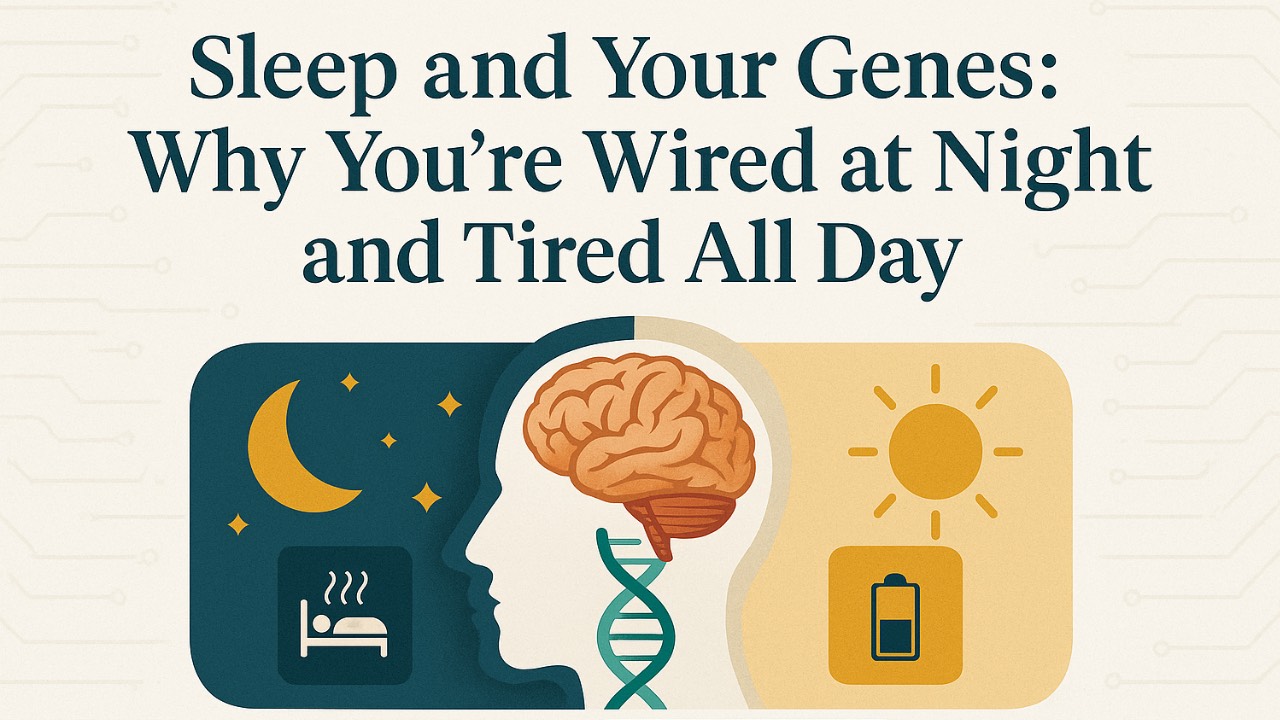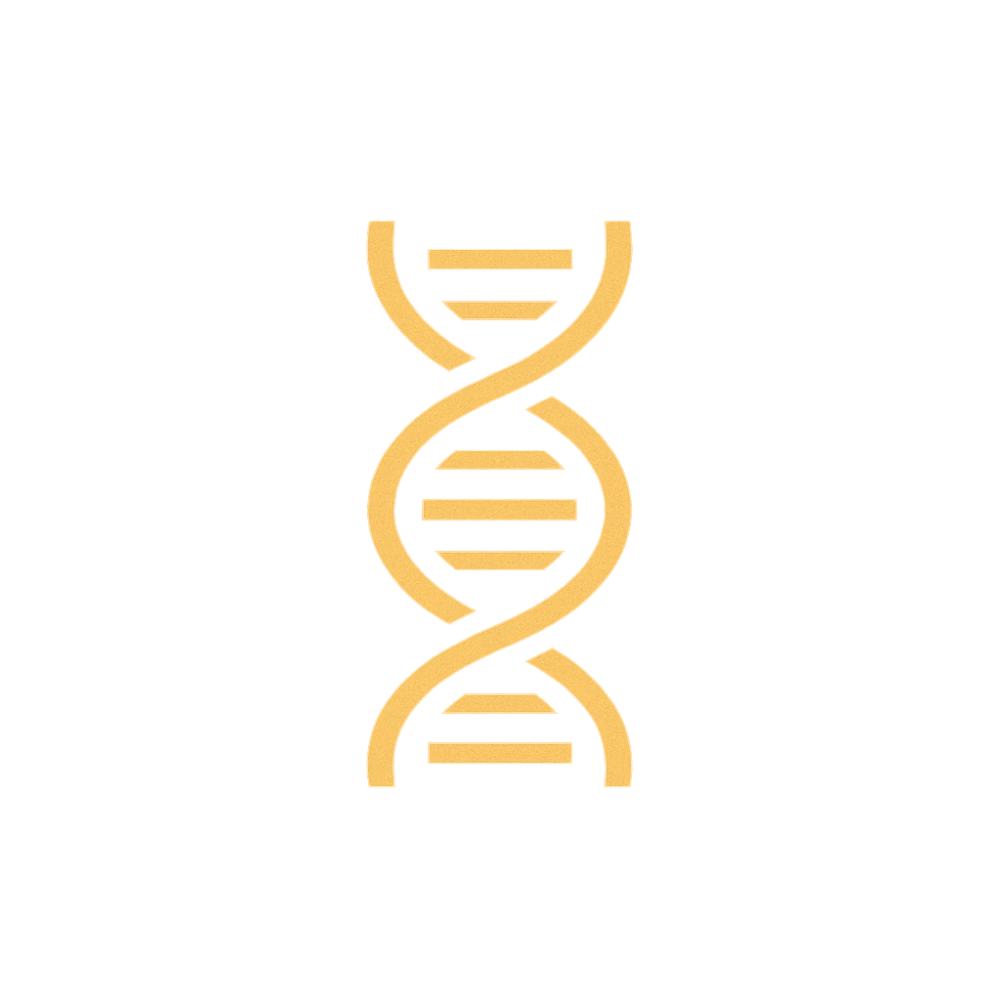Sleep and Your Genes: Why You’re Wired at Night and Tired All Day
May 13, 2025
You lie there.
Staring at the ceiling.
You’re exhausted. You’ve done all the things. The magnesium. The herbal tea. The no screens, no sugar, no fun after 7 PM routine.
And still, your brain won’t slow down. It spins. Buzzes. Replays that one thing you said three days ago. Then suddenly it’s 2:18 AM.
Somehow, you fall asleep.
Then, before you’re ready, the alarm hits. You drag yourself up. Foggy. Heavy. Not rested, just… done.
And maybe you’ve told yourself it’s just stress.
Or hormones. Or age.
And maybe that’s partly true. But there’s another layer that most people never even consider.
Your genes.
The Link Between Genetics and Sleep Struggles
What Do Your Genes Have to Do With Sleep Quality?
More than you’d think.
They help control how your body handles the whole sleep process, from the moment your eyes start feeling heavy, to the chemical shifts that keep you asleep, to the hormonal cues that wake you up feeling (hopefully) rested.
That is, if everything’s working well.
But if certain genes are a little slow, or out of sync, or just wired differently?
Sleep gets weird.
You may feel tired, but overstimulated.
You may fall asleep fine, but wake up like clockwork at 2 AM.
You may sleep 8 hours and still feel like you’ve been hit by a truck.
And it’s not your fault. It’s not even your sleep hygiene.
It might just be your system… asking for something else.
Core Sleep Genes That May Be Disrupting Your Rest
Top Genes That Influence Your Sleep Patterns
This isn’t a complete list. But here are some of the heavy hitters when it comes to genetic sleep issues:
- COMT - Clears dopamine and stress hormones. Slow function? Your brain won’t shut off.
- MAOA - Processes serotonin and melatonin. Fast version? You burn through your calm too early.
- GAD1 - Converts stimulating glutamate into calming GABA. Low activity? You can’t wind down easily.
Others include:
- DAO (histamine clearance)
- MTHFR (methylation & melatonin processing)
- PEMT (bile flow & detox)
- NQO1, GSTP1 - involved in antioxidant recycling
It’s Not Just One Gene, It’s the Pattern
What matters more than memorizing acronyms is recognizing your pattern of symptoms. Your body is talking... are you listening?
Why You Might Feel Wired at Night, Even When You’re Exhausted
Scenario 1: Overstimulated But Exhausted — The Dopamine Dilemma
This is often linked to overstimulation from genetic imbalances.
Common culprits:
- Slow dopamine clearance (COMT)
- Low GABA production (GAD1)
- Dinner foods that spike glutamate (e.g., soy, aged cheese)
- Taking methylated B vitamins late in the day
What Helps With Genetic Overstimulation at Night?
Here’s what works better than generic “sleep hygiene”:
- A warm, grounding dinner instead of a salad
- Magnesium taurate or glycinate (not oxide or citrate)
- L-theanine in tea or gum form, not mega-dose capsules
- A customized breathing ritual, not just box breathing. Look up the physiological sigh or different forms of meditative breathing strategies.
Why You Wake Up at 2–4 AM and Can’t Go Back to Sleep
Scenario 2: Sudden Night Wakings and Genetic Root Causes
It feels like good sleep — until your body flips the switch at 2 AM.
This may be caused by:
- Cortisol spikes (from stress or blood sugar drops)
- Histamine overload (from DAO/HNMT issues)
- Poor estrogen clearance (PEMT, CYP1B1)
Unexpected Triggers That Disrupt Deep Sleep
- Eating leftovers or histamine-rich foods
- A single glass of wine
- Skipping carbs with dinner
- Low DAO gene activity
Sleep-Supportive Strategies for This Pattern
- Drink bitters or dandelion tea with dinner
- Eat a warm, balanced meal with protein and resistant starch
- Avoid fermented foods if histamine is an issue
- Skip late-night intense workouts — adrenaline lingers
Why You Sleep Enough but Still Wake Up Groggy and Foggy
Scenario 3: The Detox Drain, When Sleep Isn’t Restorative
This type is tied to poor detox and methylation gene function.
Genetic blocks to look for:
- Low glutathione production (GSTP1, NQO1)
- Trouble processing melatonin (MTHFR, MAOA)
- Hormonal recirculation (PEMT dysfunction)
Morning Clues You Might Be Missing
- Puffy hands or face
- Sluggish digestion or bloating
- Sensitivity to B vitamins
- Feeling better after lemon water or sweating
Gentle Detox Tools That Actually Work
- Castor oil packs on your liver 2–3x/week
- Morning beet juice + coconut water, not energy drinks
- Niacin microdoses for NAD+ and histamine control
- Phosphatidylcholine from egg yolks or sunflower lecithin
What Should You Do Next? Track, Test, and Try Small Changes
Start by Identifying Your Unique Sleep Pattern
You don’t need to guess. You can start to map out which scenario fits you best.
- Notice your sleep-wake rhythm
- Test your genes if possible
- Stop blaming yourself when the usual “sleep tips” don’t work
Tailor Your Support, Not Everything Works for Everyone
Sometimes, it’s:
- A warm, carb-inclusive meal, not a smoothie
- Skipping your B-complex instead of adding more
- Laying off fermented foods even though they’re “healthy”
Get to the Root: Genetic Sleep Testing and Tools
Discover Your Sleep Gene Type
Want to go deeper?
- Take the Genetic Sleep Pattern Quiz → coming soon
- Explore MaxGen Labs’ genetic panel, used by practitioners to pinpoint sleep, mood, and energy imbalances from the inside out. If you're interested, check it out here. Not because it promises everything. But because it gives you a starting point that finally makes sense.
FAQs About Genetics and Sleep Disorders
1. Can your genes really affect sleep?
Yes... genes influence everything from melatonin production to stress response and detox pathways, all of which impact sleep.
2. What’s the best gene test for sleep problems?
Tests like MaxGen or DNA Life offer insights into sleep-relevant genes like COMT, MAOA, GAD1, and MTHFR.
3. Why do I wake up every night at 3 AM?
This often relates to cortisol spikes, histamine surges, or detox issues. all of which can have genetic roots.
4. Are there genetic treatments for insomnia?
While you can’t change your genes, you can support your unique biology with the right supplements, lifestyle tweaks, and timing strategies.
5. What’s the link between methylation and sleep?
Poor methylation (often due to MTHFR mutations) can impair melatonin synthesis and detox, causing unrefreshing sleep.
6. How can I figure out if histamine is affecting my sleep?
Look for patterns: do you wake after wine, leftovers, or fermented foods? DAO and HNMT gene variants may be involved.
You Are Not Flawed, Your Sleep Just Has a Backstory
This isn’t about perfect sleep. It’s about understanding your body’s unique language, which sometimes includes your DNA.
Start small.
Trust your patterns.
And above all... stop blaming yourself for not sleeping like everyone else. It's about learning how to begin working with your body, not against it. That's where understanding your genes come in to creating a personalized strategy for you.


